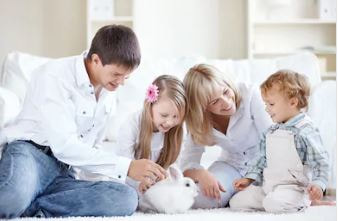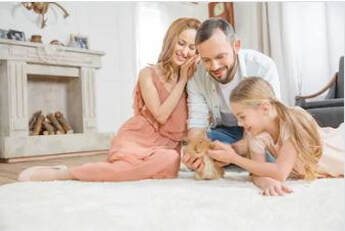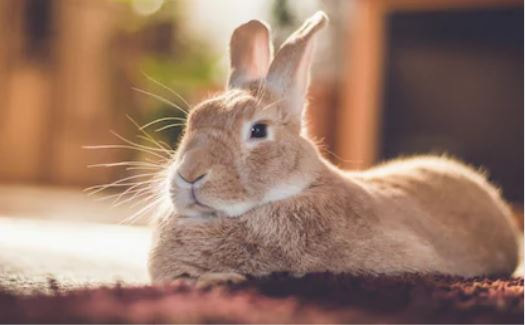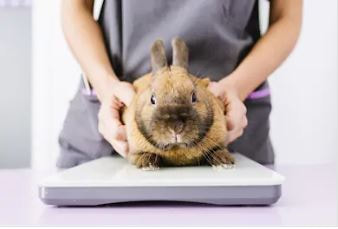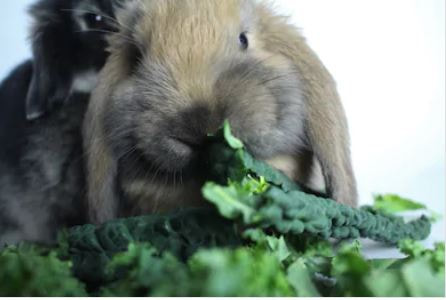Adoption Guidelines
|
If you are interested in adopting a rabbit that will share your home, please review our adoption guidelines to ensure that you meet the requirements before you fill out the adoption application. We only adopt to those who will keep their rabbits in their house or apartment.
We only adopt to adults! Rabbits and young children are usually not a good match. Because rabbits are prey animals, loud shrieks and general "kid noise," as well as grabby little hands, can frighten them. Also, children lack the maturity to take responsibility for the care of a living creature and can quickly lose interest. Although we do adopt to families with well-behaved children, an adult must have ultimate responsibility for the care and well-being of the rabbit. Our rabbits are companion animals - we do not adopt them to classrooms or as 4-H projects. |
|
Rabbits need spacious living quarters.
We house our rabbits in roomy exercise pens that provide adequate space for a litter box, toys, food and water bowls, and other accessories as well as providing plenty of space for the rabbit to hop around. We ask that you keep your rabbit in an exercise pen or a very large dog crate (minimum 4 feet x 4 feet), or free range in a bedroom or similar space. An unfinished basement does not provide a suitable environment for a rabbit unless you are able to spend lots of time interacting with your rabbit. Your rabbit must be kept in the house, provided with regular human interaction, and treated as a part of the family. If you do not own your residence, you must have prior approval to keep a rabbit from the manager of the property. |
|
Regular veterinary care must be provided.
Rabbits do require veterinary care so you must have the financial resources to provide that care with a rabbit-savvy veterinarian. In the event of a rabbit illness, you must be prepared to handle the financial responsibility. Because rabbits are considered to be "exotic" animals, veterinary costs are often higher than for dogs and cats. |
|
Rabbits are prey animals.
You must also consider the other animals in your life. Rabbits should not be kept in the same household with their natural predators, such as ferrets and snakes. Similarly, some breeds of dogs, such as terriors, were bred specifically to hunt and kill rabbits. You should not bring a rabbit into your home if there is a significant risk of injury or trauma to the rabbit. |
|
Rabbits are highly social.
There is a unique satisfaction to living with a bonded pair of rabbits. However, the bonding process can be challenging and time-consuming. Following our well-tested guidelines will increase your likelihood of success. First, if you are adopting a friend for your rabbit, your rabbit must already be spayed or neutered. Second, you must have a "neutral" place where you can introduce your rabbits. A neutral place is one where neither rabbit is allowed to go except during bonding and, therefore, is not considered to be part of either rabbit's territory. Third, you must have room to house both rabbits in separate, side-by-side pens until they are bonded. This is critical to helping the rabbits become comfortable with each other. Finally, once they are bonded, you must provide enough space for your bonded pair to live together permanently. |
|
A rabbit is a lifetime responsibility.
Your life must be reasonably stable and you must be prepared to devote the time and effort needed to properly care for a rabbit for the remainder of his/her life. With proper care, rabbits can live ten or more years. You must be committed to keeping the rabbit regardless of life changes such as moving, new family members, and other normal circumstances. |
Before you can adopt, you must complete our adoption process:
If you feel that a house rabbit would make the right companion for you and your family, please fill out our Adoption Application. You will be contacted within 48 hours after submitting your application.
Rabbit Care and Information:
- Complete and submit the adoption application.
- Participate in a telephone interview.
- Agree to a home visit (and any follow-ups) prior to receiving the rabbit.
- Review and sign the adoption contract.
- Purchase the book, "Rabbit Health in the 21st Century."
- Purchase the book, "House Rabbit Handbook (5th Ed.)."
- Pay the adoption fee, which includes:
- A rabbit that has been evaluated by a veterinarian and has been spayed/neutered, is litter-box trained, and whose personality has been matched to your adoptive home.
- Rabbit care information packet.
- A small quantity of hay, pellets, and greens.
- Telephone and e-mail support from the Columbus House Rabbit Society.
If you feel that a house rabbit would make the right companion for you and your family, please fill out our Adoption Application. You will be contacted within 48 hours after submitting your application.
Rabbit Care and Information:
| chrsbooklet.pdf |

